Landscape and Livelihood
Field Semester
August 27 - October 24, 2007
Program Overview
Course Descriptions
Frequently Asked Questions
Financial Information
Photo Gallery
2007 Program Brochure
Read what our alumni have to say about the Field Semester
 Northwest Connections Field Semester immerses a small community of learners in an intensive two-month program focusing on ecology and community-based conservation. Students learn experientially as they study the landscape of the Swan Valley and the human community it supports. NwCs instructional philosophy emphasizes participation in conservation projects as a means of developing field skills. Students also work closely with local citizens and land managers in order to understand the relationship of environmental issues to rural communities.
Northwest Connections Field Semester immerses a small community of learners in an intensive two-month program focusing on ecology and community-based conservation. Students learn experientially as they study the landscape of the Swan Valley and the human community it supports. NwCs instructional philosophy emphasizes participation in conservation projects as a means of developing field skills. Students also work closely with local citizens and land managers in order to understand the relationship of environmental issues to rural communities.
Landscape and Livelihoods residential program operates seven days per week, creating time for classroom lecture, field work, reading, reflective writing, independent study and involvement in community activities. Fifteen semester credits are earned in Forestry and Conservation, Environmental Studies, Recreation Management and Geography through a cooperative agreement with the University of Montana. Base camp for the semester is a historic homestead on the Swan River. From there, students travel throughout the Swan, Blackfoot and Flathead Valleys as well as the Swan and Mission Mountains.
Several brief homestays with local host families, a unique component of our program, connect students more intimately with our local communities and help put a human face on resource management issues. In addition to homestays, students will interact with local residents while participating in the annual Swan Valley Bird Count, community firewood day, helping out a ranching family in the Blackfoot Valley, and learning how rural residents make a living building rustic furniture and making medicinal salves. Our students truly become a part of the Swan Valley community during their two-month residence at the Beck homestead.
We admit 10-12 highly motivated applicants who are passionate about conservation and willing to commit to an intensive, experiential program.
back to top
Landscape and Livelihood Field Semester is a rigorous academic program. A typical academic day consists of a morning lecture followed by a field assignment that builds upon the mornings lesson. Evenings are reserved for reading, written work, journaling and listening to speakers.
Please if you would like to receive complete syllabi for these courses.
1. Biogeography of Northwestern Montana, Geography 395
3 credits, College of Arts and Sciences, Division of Biological Sciences
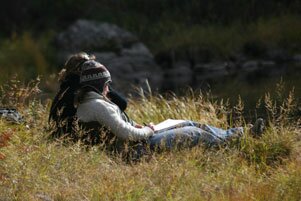
Too many students finish college without an understanding or appreciation of the natural world. In two months, you will learn more about the Swan Valley than you may even know about your childhood home. You will use your field journal skills extensively as you study, on guided hikes and through close personal observation, the flora, fauna, geology and geography of the Swan Valley and surrounding areas. You will learn to recognize patterns on the landscape produced by combinations of geological forces, climate, fire, forestry, agriculture and human settlement. You will also explore human relationships with the landscape by reading oral histories and discussing environmental change with long-time residents.
2. Watershed Dynamics, Forestry 395
3 credits, College of Forestry and Conservation

Plenty of people talk about the need to conserve and restore watersheds, but how many know how they really work? You will spend two weeks in a pair of waders learning to appreciate how water moves through the Swan, from mountain crest to valley-bottom wetland. You will investigate watershed function, stream hydrology and morphology, the ecology of aquatic habitats, and the impacts of road building and watershed fragmentation. You will help conduct stream and wetland surveys as part of NwC's ongoing monitoring efforts. And you will learn how local communities are actively protecting their watersheds and study examples of restoration in action.
3. Forests and Rural Communities, Environmental Studies 395
3 credits, College of Arts and Sciences, Environmental Studies Department

In this non-traditional forestry course, you will explore the complex relationship between forest ecosystems and human communities. You will investigate the ecology of local forests and trace the production of timber products from start to finish. You will also help inventory forest stands in non-roaded areas for a local watershed analysis. During a two day homestay, you will live with a family in the Swan Valley; this experience, along with several other group homestays, helps inform discussion of the scientific and social aspects of sustainable forestry.
4. Independent Study, Environmental Studies 496
3 credits, College of Arts and Sciences, Environmental Studies Department.

During this course, you will work closely with a mentor to develop your own expertise in an area that you came into the semester interested in, or in an area that excited you during the course of the semester. You will also do the research necessary to round out your knowledge in this area. Past students have apprenticed with loggers, oral historians, wildlife biologists, herbalists, wildlife rehabilitators, artists, trappers and private foresters. On the final day of the Semester, you will deliver a presentation to staff, students and Swan Valley community members about your experience.
Examples of past Independent Study projects
5. Field Skills for Conservation Work, Recreation Management 395
3 credits, College of Forestry and Conservation

While knowledge of practical outdoor skills is being lost in our culture, Field Semester students are expected to demonstrate mastery of wilderness first aid; field journal techniques; effective field data collection and monitoring protocol; and navigation using map, compass and GPS. In addition, you will be introduced to horse packing and stock safety, and living and traveling respectfully in bear country. By the end of the Semester, you will feel confident in this set of skills because you will have learned and practiced them in a variety of settings. These skills will expand your tool kit of abilities in the outdoors and may enhance career and educational options.
*Note: Course numbers are currently under review by University of Montana. May be subject to change.
Instructors
Steve Lamar is NwC's Program Associate. He has been putting his degree in outdoor recreation to work for over 25 years as a USFS forestry tech, a backcountry ranger here in the Swan, and an outdoor instructor and guide. Steve runs his own business collecting field data and is also an accomplished rustic furniture craftsman. Steve has worked for Northwest Connections as an instructor and field assistant on grizzly bear DNA and whitebark pine research projects. He is certainly someone you'd like to have along if you ever find yourself in a snowstorm on top of the Swan range.
NwCs Executive Director, Melanie Judge Parker, is a major player in the world of community forestry and holds Master's and Bachelor's degrees in Environmental Studies from the Universities of Montana and California at Santa Cruz. With a wealth of experience from teaching environmental studies at the secondary and university levels for over 15 years, Melanie's passion is helping students view environmental problems from multi-disciplinary perspectives. If there's ever time at the end of the day, she's also a fine guitar player with a voice to match
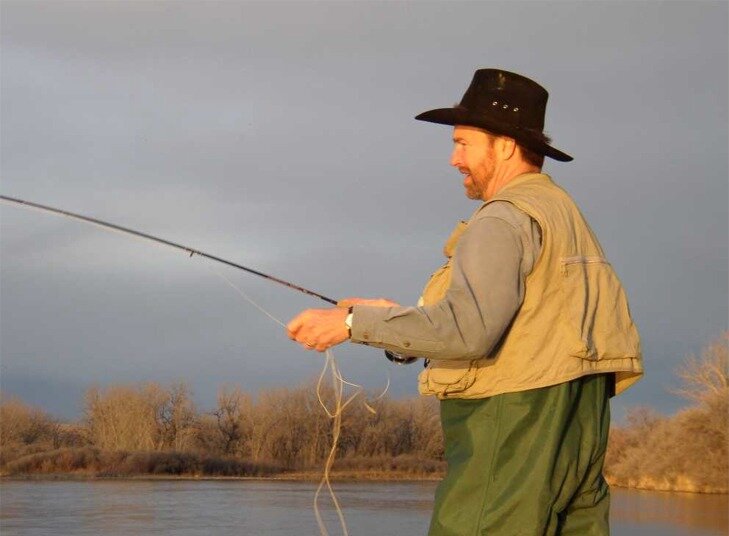 Tom Parker is NwCs Conservation Program Director. He has an intimate knowledge of the ecology and landscape of the Swan Valley from almost 30 years here as an outfitter and guide. Using his experience as a houndsman and outdoorsman, Tom has contributed to research efforts in both Yellowstone and Glacier National Parks as a field assistant studying mountain lions and lynx for the Hornocker Wildlife Research Institute and the US Fish and Wildlife Service. He also keeps track of the whereabouts of the Swan's grizzly bears and furbearers like marten, fisher and wolverine.
Tom Parker is NwCs Conservation Program Director. He has an intimate knowledge of the ecology and landscape of the Swan Valley from almost 30 years here as an outfitter and guide. Using his experience as a houndsman and outdoorsman, Tom has contributed to research efforts in both Yellowstone and Glacier National Parks as a field assistant studying mountain lions and lynx for the Hornocker Wildlife Research Institute and the US Fish and Wildlife Service. He also keeps track of the whereabouts of the Swan's grizzly bears and furbearers like marten, fisher and wolverine.
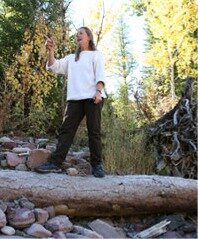
Andrea Stephens is NwC’s former Education Program Director. She is currently a Seasonal Instructor for Landscape and Livelihood. Andrea has an M.S. in Environmental Studies from the University of Montana and a B.S. in Natural Science from the University of Puget Sound. She is also a nationally registered Emergency Medical Technician. Andrea has been teaching ecology and natural history for the 18 years. For the past ten years, Andrea has conducted environmental monitoring projects with NwC’s Wildlands Volunteer Corps, using restoration as a teaching tool. She finds endless delight in examining what she's dredged up in her net from the bottom of a pond!
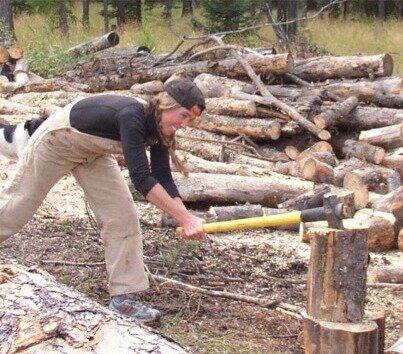 Maureen 'Mo' Hartmann is NwC's Program Director and Student Coordinator. She received her Master's Degree from the University of Montana in Environmental Studies and has since lived and worked in the Swan Valley as an instructor, community organizer, and field technician. She has lived in Montana for the past 10 years, working with state and federal land management agencies on wildlife conservation, watershed restoration and sustainable forestry projects. The best part of her day is exploring the Swan Valley while teaching and learning new birds, tracks, plants, mushrooms, and fungi with NwC students. Her second favorite activity: trail running with her dog Lewis.
Maureen 'Mo' Hartmann is NwC's Program Director and Student Coordinator. She received her Master's Degree from the University of Montana in Environmental Studies and has since lived and worked in the Swan Valley as an instructor, community organizer, and field technician. She has lived in Montana for the past 10 years, working with state and federal land management agencies on wildlife conservation, watershed restoration and sustainable forestry projects. The best part of her day is exploring the Swan Valley while teaching and learning new birds, tracks, plants, mushrooms, and fungi with NwC students. Her second favorite activity: trail running with her dog Lewis.
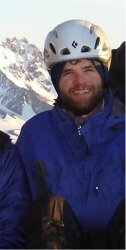
Levi Old was born and raised by the Chesapeake Bay along Virginia's eastern coast. He received a B.A. in Environmental Studies and Geography from the University of Montana and is a graduate of Northwest Connection's Winter Field Studies Program. Levi has been instructing for the Outward Bound Wilderness School in Oregon for the past two summers. He has also worked for Ecology Project International in Baja California Sur, Mexico and studied sustainable agriculture and building in Argentina. Levi likes to spend his free time fishing, rafting, and mountaineering. His main interests include rivers, sustainable farming, live music and education.
A variety of Swan Valley community members round out the instructional staff as speakers, hosts and guides. These individuals have earned their credentials in ecology through experience working on the land as hunters, trappers, outfitters and loggers.
back to top
FINANCIAL INFORMATION
NOTE: We accept Americorps education award vouchers
FEES
Fees for the 2007 Fall Field Semester
In State Tuition * $6900 Out-of-State Tuition $8900 Included in the program cost are the following:
- NwC tuition
- 15 semester credits from The University of Montana
- Wilderness First Aid Certification
- Full room and board
- All course readers
- All transportation during the field semester.
*Includes students currently enrolled in, or on leave of absence from, any Montana university.
FINANCIAL AID
Students are responsible for determining if the financial aid package from their home institution will cover course costs for the Field Semester. Many universities, including the University of Montana, will grant you a consortium agreement which is a method of transferring financial aid to a different school. Contact us if you have questions about this process or read here in our website about consortiums.
We are able to accept AmeriCorps education award vouchers. Please contact us if you would like to apply your Americorps award to the cost of the Field Semester; we can help guide you through the simple process.
Financial assistance may also be available through private foundations, federal grants and loans.
Can I transfer financial aid from my university to the Field Semester?
DEADLINES, PAYMENT AND CANCELLATIONS
Northwest Connections has a rolling admission policy. Priority status is given to applications received by April 1st.
A $900 non-refundable deposit is required to reserve your enrollment in the program. The remaining portion of your tuition is due no later than June 10th, unless other arrangements are made. Please notify our office if you would like to work out a tuition payment plan. Tuition costs:
$6,900 - in-state students
$8,900 - out-of-state students
Fees are payable by personal check or money order to Northwest Connections. We do not accept credit cards at this time.
No refunds can be made for cancellations unless another student from our waiting list can fill your space. If we can fill your space a refund will be made less the registration deposit.
Northwest Connections cannot make exceptions to this cancellation policy for any reason, including, but not limited to, illness, travel delays, personal or family situations, emergencies or weather. We urge you to investigate accident, baggage, and trip cancellation insurance with a travel agent. Travel insurance helps protect you against financial loss if you must cancel or interrupt a trip because of illness or injuries to yourself, a family member, or traveling companion.
NwC reserves the right to cancel the field semester due to insufficient enrollment. In the unlikely event of such a cancellation, NwC will notify students by April 25 and students shall be entitled to a full refund of all monies paid less the application fee. NwC is not responsible for financial loss due to non-refundable airline tickets or other such expenses.
MEDICAL INSURANCE
All students must provide their own medical insurance while in residence at NwC.
Meskipun hanya dengan Slot Depo 5k, Anda tetap bisa menikmati fitur-fitur canggih yang biasanya tersedia di permainan dengan deposit lebih besar. Fitur seperti free spin, bonus jackpot, dan grafis berkualitas tinggi memastikan pengalaman bermain tetap maksimal meskipun dengan modal kecil.
RTP Slot Tertinggi Hari Ini memberikan kesempatan terbaik bagi pemain untuk menang. RTP slot gacor yang tinggi memastikan bahwa sebagian besar taruhan yang ditempatkan akan kembali ke pemain dalam bentuk kemenangan. Slot dengan RTP tertinggi selalu menjadi pilihan yang cerdas bagi mereka yang ingin meningkatkan peluang menang tanpa perlu mempertaruhkan modal besar.
Dalam Mahjong Ways 2, pemain dapat menikmati lebih banyak cara untuk menang berkat fitur-fitur baru yang dihadirkan. Slot ini dilengkapi dengan simbol-simbol khas Mahjong yang memberi kesempatan untuk memenangkan hadiah besar. Dengan RTP tinggi dan tampilan yang memukau, Mahjong Ways 2 menjadi pilihan utama bagi para pencinta game slot bertema Mahjong.
Bermain di dunia slot menawarkan pengalaman hiburan yang tidak ada duanya, terutama saat memilih situs yang menyediakan Slot Online. Dengan grafis yang menarik dan berbagai jenis tema permainan, slot online menjadi pilihan populer di kalangan pemain. Keuntungan bermain di platform slot online adalah kemudahan akses dan fleksibilitas waktu yang ditawarkan kepada para pemain. Jika Anda ingin merasakan sensasi kemenangan besar, slot online adalah tempat yang tepat untuk dicoba.
Banyak pemain slot online mencari pengalaman bermain yang adil dan menguntungkan. Toto Slot hadir sebagai pilihan utama dengan berbagai permainan menarik dan peluang menang tinggi. Selain itu, sistem keamanan yang canggih memastikan transaksi berjalan lancar dan aman, sehingga pemain bisa menikmati permainan tanpa khawatir akan risiko keamanan atau kecurangan.
Menjadi salah satu platform paling populer, Situs Toto menyajikan berbagai pilihan permainan togel dengan tingkat keamanan yang tinggi. Para pemain bisa merasa tenang saat melakukan transaksi atau taruhan di platform ini.
Keunggulan utama dari Slot777 adalah kemampuannya dalam memberikan hadiah besar dengan taruhan kecil. Banyak pemain telah membuktikan bahwa slot ini sering memberikan kemenangan besar berkat sistem fair play yang diterapkan. Jika Anda mencari permainan yang seru dan menguntungkan, game ini bisa menjadi pilihan tepat.
Banyak orang kini beralih ke sistem praktis seperti Depo 10k yang menawarkan cara bermain fleksibel dengan biaya rendah, cocok untuk hiburan sehari-hari.
Popularitas slot gacor Thailand terus meningkat karena reputasinya yang memberikan kemenangan lebih sering, memungkinkan pemain untuk mengoptimalkan strategi taruhan sambil tetap merasakan keseruan setiap putaran tanpa rasa cemas kehilangan peluang besar.
Bermain Toto Macau tidak hanya sekadar mengandalkan keberuntungan semata, tetapi juga strategi yang matang. Pemain berpengalaman sering kali memanfaatkan pola angka yang muncul dari hasil sebelumnya untuk meningkatkan peluang mereka. Dengan pemahaman mendalam terhadap pola dan sistem permainan, bettor dapat menghindari kesalahan umum dan memaksimalkan peluang menang di setiap taruhan.
Informasi asli dari Keluaran macau selalu dirujuk oleh pemain berpengalaman, sebab tanpa data resmi mereka tidak bisa memastikan validitas angka yang beredar di komunitas.
Para pemain yang serius sering hanya memilih Togel Resmi karena mereka ingin menghindari risiko penipuan dan memastikan setiap taruhan mereka dihitung dengan sistem yang terpercaya dan fair.